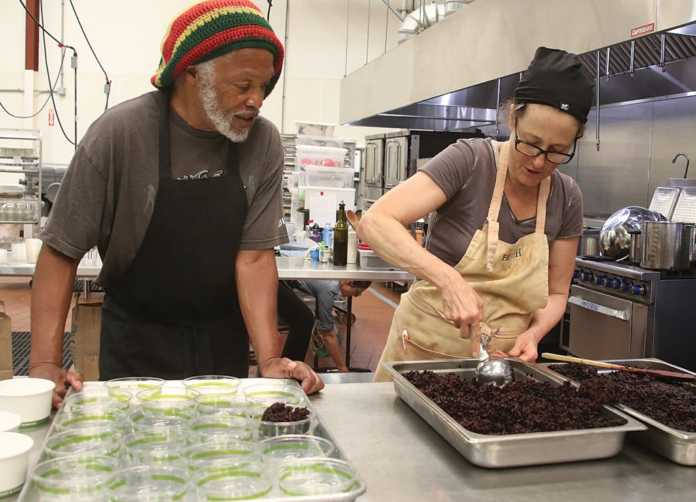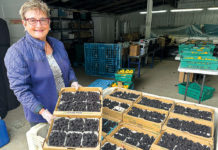WATSONVILLE — In 1979, Watsonville became the epicenter of social change as the community rallied to support Latino and Spanish-speaking business owners.
Protecting rights and providing equal access to business opportunities helped give rise to El Pájaro Community Development Corporation.
El Pájaro CDC this year is celebrating 40 years of transforming people’s lives through entrepreneurship by taking the confusion, guesswork and complexity out of starting small businesses. By offering technical, legal, financial and managerial assistance, El Pájaro CDC has helped launch and nurture small businesses while bolstering economic development within the community.
“If you give someone an opportunity it can change lives, and lead to generations of success,” said Carmen Herrera-Mansir, executive director of El Pajaro CDC. “To see a journey from farmworker to entrepreneur — many started that way when they came to us — is so rewarding.”
To celebrate its 40th anniversary, El Pájaro CDC will hold a Tacos and Tapas event on Aug. 29 from 6-9 p.m. at the organization’s Commercial Kitchen Incubator at 412 Riverside Drive in Watsonville.
“It’s a celebration of a very strong legacy of passion for helping the community,” Herrera-Mansir said. “We’re grateful for everyone who has played a role in helping us grow.”
El Pájaro CDC offers low-cost and free bilingual business education and training workshops to low-income entrepreneurs. Workshops cover business plan preparation, marketing and sales, customer service, bookkeeping, computer basics, business management and financial literacy.
In 1997, El Pájaro CDC created a retail business incubator at 23 Beach St. in downtown Watsonville to assist low- to moderate-income, Spanish-speaking entrepreneurs with starting and operating a successful business. The incubator houses dozens of businesses, including Taqueria La Fuente, Furteria Quetzal and Carol’s Flowers and Decorations.
Rosa Ayala can attest to El Pájaro CDC’s impact on small local businesses. An immigrant from Guadalajara, Mexico, Ayala came to the United States in the late 1980s and worked multiple jobs while taking care of five kids as a single mom. She worked in the restaurant industry and spent some time picking berries in the fields before settling into the breakneck lifestyle of working two part-time jobs — one as a driver and another at a nursing home in Santa Cruz.
On the side, Ayala would set up shop at the Watsonville Flea Market every Sunday and sell shoes, a passion project that slowly developed into her own shoe store, Zapateria Estrella, which has been open in Plaza Vigil since 2015.
Ayala said making the shift from the flea market to an established brick and mortar location brought several challenges.
“In reality, you don’t know how to start,” she said through a translator. “It sounds easy. It sounds like you can just set up and sell, but once they started asking questions you see how its more than that. What’s the business name? What are you going to sell? What’s your business strategy? How much space do you need? It’s a lot harder than you think.”

Rosa Ayala, right, has run Zapateria Estrella in Plaza Vigil since 2015. — Tarmo Hannula/Pajaronian
But with El Pájaro CDC’s classes, she was able to learn the ropes of owning a small business — when to open, how to advertise, how to schedule sales, how and when to upscale. They also helped her obtain the right permits and loans to get her started and steady.
“It’s beautiful that there are people that want to help you,” Ayala said. “Sometimes the world feels like it wants to shut you out. Things get hard. But there are people out there who do want to help.”
Another 44 food purveyors use El Pájaro CDC’s separate Commercial Kitchen Incubator Program, a fully equipped, shared-use facility. By using the commercial kitchen services, local food entrepreneurs can save the costs of restaurant-grade equipment and county licenses that can restrict their ability to start or expand food businesses.
Beth Freewomon said her business, The Open Hearth of Santa Cruz, has been utilizing El Pájaro CDC for years and said that it has proven to be an indispensable asset.
“We’re not the typical incubator business, like many folks here,” she said. “But we needed to expand and to gain use of more space and the great equipment they have here. It’s a perfect fit. Everyone here is so nice and helpful.”
Freewomon said she typically visits CDC one day a week with a crew of about seven people to prepare various foods for her organic meal delivery service.
“This place is wonderful,” she said. “It’s well-maintained; it’s clean; and they have modern equipment. Even things like the racks and large sinks — it’s just what we needed.”
In 1999, El Pájaro CDC board decided to expand its mission to include housing development. El Pájaro CDC was one of three partners that developed Northgate Apartments in Watsonville, an 84-unit, affordable housing complex for families of 4-7 members.
Following a charter expansion in 2007, El Pájaro CDC now serves Santa Cruz, Monterey and San Benito counties, and is available to anyone with plans to open a small business.
While many businesses helped by El Pájaro CDC are food and produce-related, all business concepts — lawyers, mechanics, contractors, small farmers, landscapers, musicians and more — are eligible for assistance.
Watsonville Diesel owner Alfredo Garcia is another one of El Pájaro CDC ’s success stories. After working eight years as the manager of the Monte Vista Christian School transportation fleet, he started Watsonville Diesel in 2009. His company was successful, but Garcia needed help to expand. So he reached out to El Pájaro CDC for help with marketing and business strategy as well as loan applications.
He was able to expand to Hollister a few years ago, and relocated his Watsonville location to its current space at 101 Aviation Way, a 20,500-square-foot diesel repair facility.
“It was a big project, and it required a lot back and forth with everyone,” he said.
Now, Garcia pays it forward by conducting mini-training sessions with local high school students recommended by teachers. He welcomes in about a dozen students a year, and he has hired two who completed their technical schooling and returned to work in their community.
“I want to give back, I want to help the community if I can,” Garcia said. “I like helping people.”
•••
• As El Pájaro CDC looks back on 40 years, it looks forward to the future, including a handful of projects planned for the next two years, including:
• A kitchen retail store at Plaza Vigil Incubator named Food Artezano, offering food products created in the kitchen incubator, as well as local art, including painting and sculpture, ceramics, T-shirts, postcards and jewelry. It will also include an online store.
• A 5,000-square-foot, small-batch, co-packing facility at the kitchen incubator, allowing food businesses to expand their business and markets.
● A new microloan program that will give small businesses more control, better access and expanded loan opportunities.
• Improved programs to help entrepreneurs manage their financing, credit, record-keeping and more.











